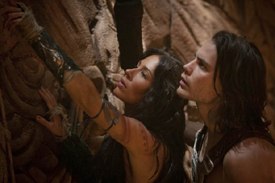SUPERMAN, LORD OF THE RINGS, STAR TREK, STAR WARS, AVATAR and dozens of other sci-fi and fantasy tales owe their origins to Edgar Rice Burroughs' Barsoom series. This new film is based on Burroughs' A PRINCESS OF MARS, a classic of pulp fiction. Now Andrew Stanton, who won Oscars for FINDING NEMO and WALL*E, has brought the world to the screen.

SUPERMAN, LORD OF THE RINGS, STAR TREK, STAR WARS, AVATAR and dozens of other sci-fi and fantasy tales owe their origins to Edgar Rice Burroughs' Barsoom series. This new film is based on Burroughs' A PRINCESS OF MARS, a classic of pulp fiction. Now Andrew Stanton, who won Oscars for FINDING NEMO and WALL*E, has brought the world to the screen.
John Carter (Taylor Kitsch, WOLVERINE) is your Han Solo-esque reluctant hero type. A Civil War vet who refuses to get pulled back into a cause (Indian Wars) because he is only seeking gold. But fate has other plans and like Frodo, he gets thrust into a world he couldn't imagine when he gets teleported to Mars. In a reverse of Superman's tale, he, the Earthling, travels to another planet and gains superpowers because of the alien world's environment. Like the worlds of STAR TREK and STAR WARS, various alien races are warring and the good guys must stop the superior weaponry of the villains. Like in AVATAR, Carter is a human who establishes himself as a leader in an alien culture. In this world of Mars, aka Barsoom, the giant, four-armed alien race is led by Tars Tarkas (Willem Dafoe, SPIDER-MAN).
In the long tradition of fantasy, there is a princess named Dejah Thoris (Lynn Collins, WOLVERINE), who is being forced to marry the enemy of her kingdom. This villainous warrior is named Sab Than (Dominic West, 300). He has been waging a campaign of destruction across the planet, using a superior weapon given to him by the mysterious Matai Shang (Mark Strong, SHERLOCK HOLMES), the leader of the Therns, a bald, pale, robed species bent on shaping the future of Barsoom. But the princess has developed a new technology that could save her people, but the Thern secretly sabotage it.
At the core of the story is the romance between John Carter and Dejah. John Carter is a heartbroken man, suffering over the murder of his wife and child. The princess is a smart warrior who is trying to escape a forced marriage. A hero trying to save a princess in distress is a tried and true element of sci-fi and fantasy. In 1912, saving the princess was motivation enough, but modern audiences need more. While Kitsch and Collins' screen chemistry sells the romance to some degree, it never fully comes over the hurdles of Carter's relationship with his wife, who serves as his key motivation for not wanting to fight. This comes strikingly to the forefront in the brilliant sequence where Carter cartoonish single-handed destruction of an army of aliens is given emotion poignancy as the clash of his blade is cut with the strike of the shovel as he buries his loved ones. At this point, we feel the switch in him. He will not let the innocent be murdered by the horde again. However, how does this transition to love for Dejah?
Admittedly, I am not a student of Burroughs' world. I can only judge what was presented on the screen. But it seems that it brings into play too many of the problems of an early 20th century view of the universe. Tars Tarkas and his Thark use guns, so why are they not superior to the human-like Barsoomians who are still using swords? I mean when the Thern give Sab lasers, he takes over pretty quickly. Just look back at the list of worlds that have been influence by this one. They borrowed pieces that fit into their worlds. At times, all the ideas seem crammed into this one.
All these issues weaken the experience, but never break it. Most importantly, I cared about John Carter and Dejah. While I might not have fully bought their quick romance, their motivations to save Barsoom did resonate. Carter wants to fight for Barsoom where he failed to do so on Earth. Dejah wants to lead her people, but she is forced into the position of political pawn. While their stories might be set against a muddled world, it is still endlessly inventive. Stanton honors Burroughs ingenuity with a grand scale, assured pacing and the right dose of levity.







